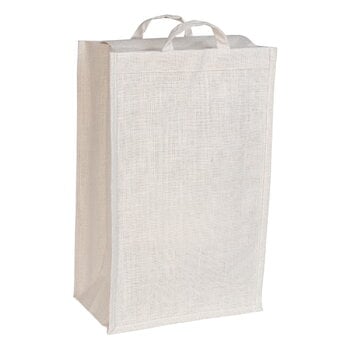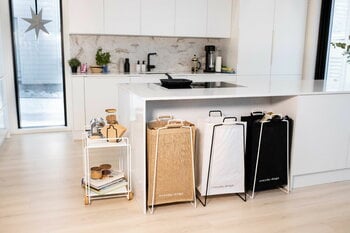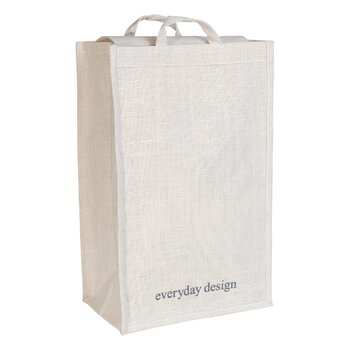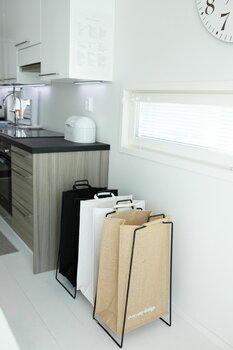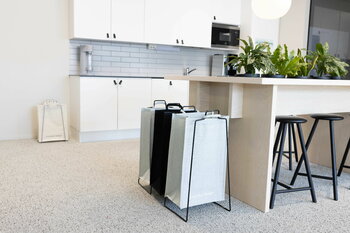Everyday Design's Turku XL jute bag complements the look and functionality of the Turku bag holder. The sustainable bag is a handy helper for collecting bottles, cardboard and other recyclable items, but can also be used on its own as a big shopping bag, laundry basket or storage unit. The jute bag features a minimalist Everyday Design logo on the other side as well as a handy flap on the inside to hide its content from curious eyes.
Turku XL jute bag, off-white
Everyday Design
Description
Everyday Design's Turku XL jute bag complements the look and functionality of the Turku bag holder. The sustainable bag is a handy helper for collecting bottles, cardboard and other recyclable items, but can also be used on its own as a big shopping bag, laundry basket or storage unit. The jute bag features a minimalist Everyday Design logo on the other side as well as a handy flap on the inside to hide its content from curious eyes.
Product details (8)
- Material
- Jute, plastic inner surface
- Colour
- Off-white
- Width
- 38 cm
- Depth
- 23 cm
- Height
- 57 cm
- Weight
- 0.5 kg
- Notes
- Please note that jute is a natural material, so there may be differences in shade between the bags.
- Care instructions
- Handwash max. 30°C. We do not recommend storing the bag in direct sunlight to prevent its colours from fading.
- Product ID
Designer
Helena Mattila is a Finnish industrial designer who has worked as CEO and head designer of the Finnish design brand Everyday Design since 1995. Mattila’s smart and timeless designs have been awarded with several international design awards, and they have been seen at New York’s MoMA’s and Design Museum London’s design stores. Besides a designer, Mattila is also an artist who inspires from nature and ecological thinking.
View all productsReviews (6)
4.83
Based on 6 reviews
-
A
Anna-Maria B
327 days ago
-
N
Nicola T
Cuglieri, Italy
Bella e robusta con una fascia che può essere usata per coprire quello che ci si mette dentro
324 days ago
-
A
Anna T
Pori, Finland
291 days ago
Sustainability
The Product Sustainability Framework, our criteria of sustainable design, helps you find the most sustainable products in our selection. Read below which sustainability criteria this product has met.
Working conditions & labour 9/9
-
Equal opportunities for all employees
-
Commitment to UN Global Compact, fair compensation for all employees
-
Corporate responsibility requirements defined and communicated for suppliers
-
Systematic work for improved inclusion and well-being in the workplace
-
Transparent supply chain
-
Suppliers' compliance to a code of conduct ensured
-
Direct suppliers audited and certified
-
Compliance to the UN Guiding Principles on Business and Human Rights ensured in the supply chain
-
Support for community involvement in the supply chain
Eco-friendly production 8/9
-
Fair and resource-wise water-use in production
-
No incineration or landfilling of returned items
-
No use of endangered species as materials
-
No direct environmental emissions or waste (excl. GHGs) from production
-
The sustainability of direct suppliers' production is addressed and monitored
-
Production and material sourcing that respect biodiversity, animal rights, and natural ecosystems
-
Material-efficient and ecological packaging
-
No potentially harmful chemicals used in own production
-
Positive impact on nature’s well-being through operations that regenerate natural ecosystems
Climate impact 4/8
-
Company's direct greenhouse gas emissions identified and commitment to reduction
-
Product's carbon impact identified and commitment to reduction
-
Guidance on energy- and eco-efficient use of the product
-
Contribution to climate initiatives beyond the brand’s direct operations
-
Low-carbon or compensated transportation
-
Carbon footprint of the product calculated and goals set to reduce it
-
100 % renewable energy in own production and operations
-
Carbon neutral or carbon negative product
Sustainable materials 5/6
-
Sustainable and long-lasting material choices
-
No harmful or hazardous substances
-
Responsible raw material sourcing and production
-
Materials suited for circularity: monomaterials, recyclable finishings, renewable or recycled contents etc.
-
Ecological materials: natural, biodegradable, recyclable or recycled contents
-
Outstanding materials in terms of innovativeness, responsibility, sustainability and circularity: local production or sourcing, 100 % recycled content, C2C-certification etc.
Circular design 5/5
-
High aesthetic quality promoting long-term use of the product
-
Technically durable product design and material choices
-
Design for enduring life-long quality
-
Design and support for product maintenance, repair and upgradability
-
Innovative circular design solutions: circular service system, resale platform, remanufacturing, collection of used products, etc.
